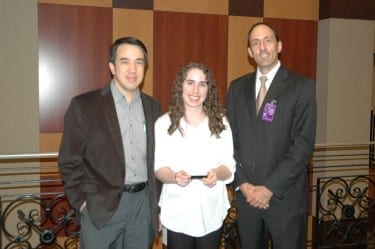I had the great pleasure on Dec. 5 of attending the DMU Research Symposium, which was an shining showcase of a lot of hard work by very smart, inquisitive DMU students and faculty, medical residents and even some undergraduates. It was great to hear all the provocative discussions about the posters and oral presentations. I did not envy the organizing committee’s task of picking the award recipients for outstanding work.

I do envy, however, those who are able to wrap their brains around the many topics of the featured research projects. Taking the outstanding undergraduate poster award, for example, was Nayasha Madhan, whose project with DMU faculty Andrew Brittingham, Ph.D., and Wayne Wilson, Ph.D., and research assistant Prajakta Pradhan was titled “The Cloning, Recombinant Expression, and Characterization of Glycogen Synthase from the Parasitic Protozoan Trichomonas vaginalis.” Lara Terry, a student in DMU’s master of biomedical sciences program, won an award for her poster with co-authors Mark Ver Meer and Jennifer Giles, both DMU research assistants, and Associate Professor Kim Tran, Ph.D., M.D., titled “Regulation of Store-operated Ca2+ Entry in the Vascular Endothelium by the G Protein-coupled Estrogen Receptor 1.”
While the descriptions of all the symposium projects in the symposium’s printed program were very helpful, I love how Science magazine and the American Association for the Advancement of Science (AAAS) strive to make contemporary science more accessible with their annual Dance Your Ph.D. contest. Now in its sixth year, the competition invites doctoral students and Ph.D. recipients to explain their research through interpretive dance.
The winner of the 2013 contest was Cedric Tan, Ph.D., a biologist at the University of Oxford in the United Kingdom, whose dissertation was titled “Sperm Competition Between Brothers and Female Choice.” The contest website explains: “His dance interpretation of that research illustrates the chicken mating process using a range of styles, from swing and water ballet – yes, in actual water – to modern jazz and what can only be described as cockfighting.”
The contest shows that researchers indeed are creative, have a sense of humor and possess some pretty nifty dance chops. It also shows that, with a bit of interpretation, we all can understand scientific inquiry a little better. Check it out!

